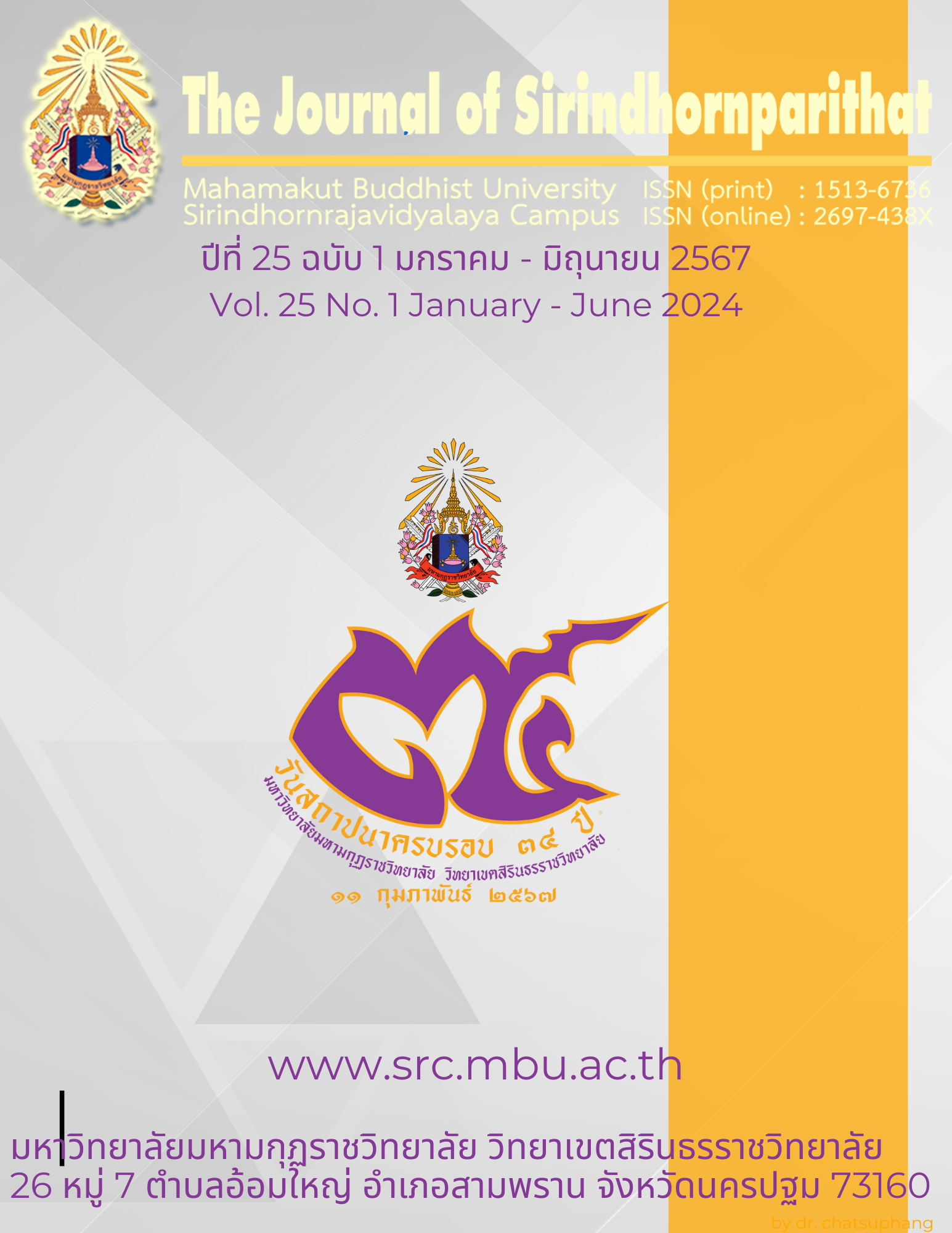Human Cost Management and Good Management Principles Affecting Human Capital Development of Sub-District Municipality in Nakhon Pathom Province
Keywords:
human capital administration, good governance principles, human capital developmentAbstract
The research purposes were: (1) to study the level of human capital administration, good governance principles, and the human capital development of Subdistrict Municipalities in Nakhon Pathom Province; (2) to study the human capital administration and good governance principles affecting the human capital development of subdistrict municipalities in Nakhon Pathom Province; (3) to propose the approaches and new knowledge for the human capital development of subdistrict municipalities in Nakhon Pathom Province. This was the quantitative research and quantitative research. The target population was the personnel of subdistrict municipalities in Nakhon Pathom Province. The sample group for quantitative research was the 400 personnel, and the research instrument was the questionnaire. The sample group for qualitative research was the 18 personnel, and the research instrument was the in-depth interview form. The data analysis statistics were the frequency, percentage, mean, standard deviation, multiple regression analysis, and correlation analysis.
The research findings were: (1) human capital administration of Subdistrict Municipalities in Nakhon Pathom Province found the overall was at high level; the descending mean were: the aspect of leadership practices guidelines, the aspect of learning capacity, the aspect of workforce optimization, the aspect of access to learning, and the aspect of personnel engagement; the good governance principles of Subdistrict Municipalities in Nakhon Pathom Province found the overall was at high level; the descending mean were: the efficiency aspect, the morality/ethics aspect, the accountability aspect, the rule of law aspect, the responsiveness aspect, the transparency aspect, the equity aspect, the decentralization aspect, and the participation aspect, respectively; (2) the human capital administration in the aspect of leadership practices guidelines, the aspect of personnel engagement, and the aspect of workforce optimization versus the good governance principles in the accountability aspect, the participation aspect, and the morality/ethics aspect affected to the human capital development of subdistrict municipalities in Nakhon Pathom Province at statistical significance level .05; and (3) should applied the leadership practices guidelines to build personnel engagement to increase the efficiency and also requires the responsibility, participation, and uphold the virtues to achieve sustainable development.
References
ณัฐวุฒิ โรจน์นิรุตติกุล. (2554). การจัดการทุนมนุษย์:กลยุทธ์ทางการแข่งขันที่ยั่งยืน. วารสารครุศาสตร์อุตสาหกรรม. 10(2), 1-6.
ดวงเดือน ศิริโท. (2561).การพัฒนาทุนมนุษย์ตามหลักธรรมาภิบาลที่ส่งเสริมประสิทธิผลโรงเรียนเอกชนในภาคตะวันออกเฉียงเหนือ. ดุษฎีนิพนธ์ศึกษาศาสตรดุษฎีบัณฑิต สาขาวิชาการบริหารการศึกษา มหาวิทยาลัยการจัดการและเทคโนโลยีอิสเทิร์น จังหวัดอุบลราชธานี.
นิลาวัลย์ สว่างรัตน์. (2561). การพัฒนาทุนมนุษย์เพื่อเพิ่มประสิทธิภาพการปฏิบัติงาน ของพนักงานอุตสาหกรรม. Veridian E-Journal, Silpakorn University. 11(2).
นิสดารก์ เวชยานนท์. (2554). การบริหารทุนมนุษย์เชิงกลยุทธ์. กรุงเทพมหานคร: โกลเด้นท์ไทม์พริ้นติ้ง.
พิมใจ บุญนิล. (2564). การพัฒนาทุนมนุษย์เพื่อเพิ่มประสิทธิภาพการปฏิบัติงานของข้าราชการทหาร สังกัดกรมควบคุมการปฏิบัติทางอากาศ. วารสารรัฐประศาสนศาสตร์ มหาวิทยาลัยราชภัฏสวนสุนันทา. 4(2).
ลัดดาวัลย์ สุดสวาท. (2560). การพัฒนาทุนมนุษย์ในเขตเศรษฐกิจพิเศษ จังหวัดสระแก้ว. รัฐประศาสนศาสตรดุษฎีบัณฑิต มหาวิทยาลัยราชภัฏวไลยอลงกรณ์ ในพระบรมราชูปถัมภ์.
วิลาวัลย์ อันมาก. (2556). การศึกษาการบริหารการเปลี่ยนแปลงของผู้บริหารโรงเรียนมัธยมศึกษา ของรัฐ สังกัดสำนักงานเขตพื้นที่การศึกษามัธยมศึกษา เขต 2. สารนิพนธ์ปริญญาการศึกษามหาบัณฑิต มหาวิทยาลัยศรีนครินทรวิโรฒ.
สำนักงานเลขาธิการสภาผู้แทนราษฎร. (2560). หลักธรรมาภิบาลในรัฐธรรมนูญแห่งราชอาณาจักรไทย พุทธศักราช 2560. สำนักงานเลขาธิการสภาผู้แทนราษฎร.
สุพตน์ มิตรยอดวงศ์. (2559). ปัจจัยที่ส่งผลต่อการพัฒนาทุนมนุษย์ของข้าราชการกองทัพอากาศ. วิทยานิพนธ์ปรัชญาดุษฎีบัณฑิต คณะสังคมศาสตร์และมนุษยศาสตร์ มหาวิทยาลัยราชภัฎสวนสุนันทา.
สุมลฑา สังใจสม. (2555). การพัฒนาทุนมนุษย์ของสำนัก หอสมุดกำแพงแสน. บทความการประชุมวิชาการแห่งชาติ ครั้งที่ 9 มหาวิทยาลัยเกษตรศาสตร์ วิทยาเขตกำแพงแสน.กรุงเทพมหานคร: มหาวิทยาลัยเกษตรศาสตร์ วิทยาเขตกำแพงแสน.
Awan, M. A. S., Sarfraz, Naintara. (2013). The Impact of Human. Capital on Company Performance and the Mediating effect of Employee’s Satisfaction. Journal of Business and Management. 8(2): 76-82.
Colby, D. & Collins, E. (2013). Fundamentals of Theory of Change. 2013. ActKnowlege Webinar: Fundamentals of Theory of Change. 2013.
Cronbach, L. J. (1970). Essentials of Psychological Test (5th ed.). New York: Harper Collins.
Taro Yamane. (1973). Statistics: An Introductory Analysis. 3rd Ed. New York. Harper and Row Publications.
Taylor, G. and Richardson, G. (2014). Incentives for Corporate Tax Planning and Reporting: Empirical Evidence from Australia. Journal of Contemporary Accounting &Economics, 10: 1-15.

Downloads
Published
Issue
Section
License
Copyright (c) 2024 Mahamakut Buddhist University

This work is licensed under a Creative Commons Attribution-NonCommercial-NoDerivatives 4.0 International License.
บทความที่ได้รับการตีพิมพ์เป็นลิขสิทธิ์ของ มหาวิทยาลัยมหามกุฏราชวิทยาลัย วิทยาเขตสิรินธรราชวิทยาลัย
ข้อความที่ปรากฏในบทความแต่ละเรื่องในวารสารวิชาการเล่มนี้เป็นความคิดเห็นส่วนตัวของผู้เขียนแต่ละท่านไม่เกี่ยวข้องกับหาวิทยาลัยมหามกุฏราชวิทยาลัย วิทยาเขตสิรินธรราชวิทยาลัย และคณาจารย์ท่านอื่นๆในมหาวิทยาลัยฯ แต่อย่างใด ความรับผิดชอบองค์ประกอบทั้งหมดของบทความแต่ละเรื่องเป็นของผู้เขียนแต่ละท่าน หากมีความผิดพลาดใดๆ ผู้เขียนแต่ละท่านจะรับผิดชอบบทความของตนเองแต่ผู้เดียว



